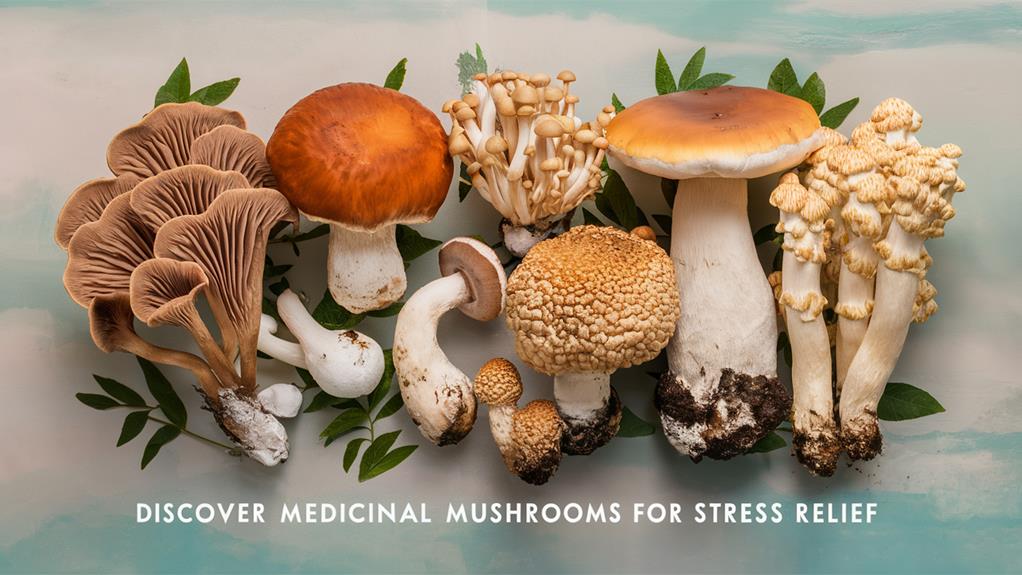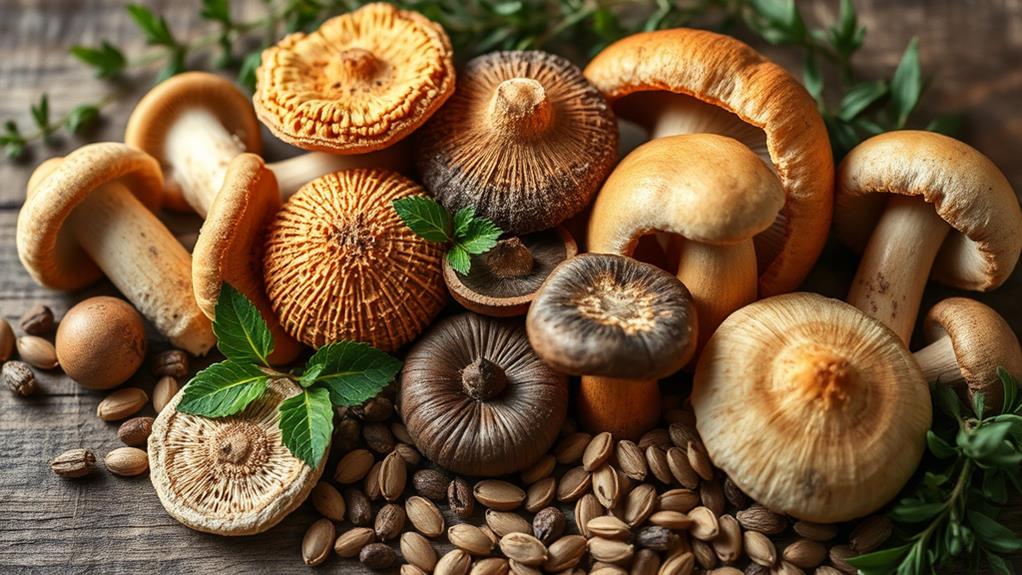
Medicinal mushrooms are an effective natural remedy for stress relief, offering adaptogenic properties that can help you manage stress more effectively. Key types include Reishi, known for calming effects; Lion's Mane, which boosts cognitive function; and Cordyceps, which increases energy and resilience. These mushrooms help regulate stress hormones, lower cortisol levels, and support overall immune function. They're also rich in vitamins and minerals, promoting mood regulation. You can easily add these mushrooms to your diet through soups, smoothies, or supplements. Stay tuned to discover more about how these fungi can transform your stress management routine.
Overview of Medicinal Mushrooms

Medicinal mushrooms have gained attention as powerful allies in promoting stress relief and overall well-being. These unique fungi, like reishi, lion's mane, and cordyceps, boast impressive medicinal properties.
Reishi mushrooms, known for their enhanced immune function, are particularly effective in stimulating immune responses, which can be beneficial during stressful times. They're known for their adaptogenic properties, which help your body resist stressors and recover more effectively. By incorporating these mushrooms into your diet, you might find relief from anxiety, as research suggests a connection between consuming medicinal mushrooms and improved mental health.
These mushrooms for anxiety not only support your immune system but also offer antioxidant and anti-inflammatory effects, which are beneficial for stress relief. For example, lion's mane can stimulate the production of nerve growth factor (NGF), enhancing cognitive function and brain health. This can be particularly important when you're feeling overwhelmed.
Moreover, the therapeutic potential of medicinal mushrooms extends to their influence on your gut microbiota, which plays a role in mood regulation and stress management.
Benefits of Adaptogenic Mushrooms
Adaptogenic mushrooms, like reishi, lion's mane, and cordyceps, offer impressive benefits for your body and mind. They help regulate stress hormones, support your immune system, and even enhance cognitive function, making it easier to handle daily challenges.
Notably, reishi mushrooms are known for their immune system support, which can further bolster your resilience during stressful times. Incorporating these mushrooms into your routine could be a game-changer for your overall well-being.
Stress Hormone Regulation
Stress management isn't just about coping mechanisms; it also involves regulating the body's stress hormones. Adaptogenic mushrooms, like reishi and lion's mane, play a significant role in this process. They help balance the hypothalamic-pituitary-adrenal (HPA) axis, which controls your stress response. By doing so, these mushrooms can lower cortisol levels, a key stress hormone.
When cortisol levels drop, you may experience less physical and emotional stress, improving your overall well-being.
Research shows that lion's mane not only helps regulate cortisol but may also reverse stress-related changes in neurotransmitters. This suggests it can boost your mood and cognitive function.
Furthermore, cordyceps mushrooms have shown promise in enhancing resilience to stress by reducing markers linked to both physical and psychological stress. Additionally, reishi mushrooms are known for their immune system enhancement, which can further support your body in managing stress effectively.
Adaptogenic mushrooms also offer health benefits by reducing inflammation, often associated with chronic stress. Since inflammation can lead to various health issues, addressing it is crucial for your overall health.
Immune System Support
While many people turn to conventional remedies for immune support, incorporating mushrooms like reishi and cordyceps into your diet can offer significant benefits.
These adaptogenic mushrooms are known for enhancing your immune system by increasing the activity of your natural killer cells, which are crucial in fighting infections. Reishi mushrooms, in particular, can boost your white blood cell counts, helping your body respond more effectively to illness.
Research has shown that the polysaccharides in reishi possess immunomodulatory properties, which means they help regulate and support your immune system activity. This is especially important for those who might struggle with health issues.
Regular consumption of adaptogenic mushrooms can lead to better resistance against stress-induced immune system suppression, which is vital for maintaining your overall health and wellness.
Cordyceps also play a role in enhancing immune function while reducing inflammation, making you more resilient against illnesses.
By adding these mushrooms to your routine, you're not just aiming for stress relief; you're actively supporting your immune system and promoting a healthier you.
Embracing these natural solutions can truly transform your approach to health.
Cognitive Function Enhancement
Mushrooms like Lion's Mane and Reishi offer remarkable benefits for cognitive function, making them powerful allies in enhancing mental clarity and memory.
Lion's Mane, in particular, stimulates nerve growth factor (NGF), which plays a vital role in supporting brain health. By promoting the growth and repair of neurons, this medicinal mushroom can enhance learning capabilities and potentially reverse stress-related changes in neurotransmitters that affect your cognitive function.
If you struggle with anxiety, Reishi can be a great help. Its calming effects regulate the nervous system, reducing stress and promoting better focus. This means you can think more clearly and tackle tasks with greater ease.
Moreover, Cordyceps can be beneficial too, as it boosts energy levels and helps reduce fatigue, indirectly supporting your cognitive performance during stressful situations.
The anti-inflammatory properties of these medicinal mushrooms also positively influence mental health, making them valuable for combating stress-related cognitive decline.
Key Types for Stress Relief

When it comes to stress relief, several key types of medicinal mushrooms stand out.
Reishi is great for calming your nerves, while Lion's Mane can help sharpen your focus and boost brain health.
If you're looking for more energy to combat stress, Cordyceps might be just what you need.
Reishi's Calming Effects
If you're seeking a natural way to ease stress and promote relaxation, look no further than the reishi mushroom (Ganoderma lucidum). Known for its calming effects, reishi has been celebrated in Eastern medicine for over 2,000 years. This adaptogenic mushroom helps regulate your nervous system, making it a powerful ally against stress and anxiety.
Reishi contains bioactive compounds like triterpenoids and polysaccharides, which contribute to its potential anti-anxiety effects. By incorporating reishi into your routine, you may notice significant improvements in your mental health. Studies suggest that long-term consumption can lead to better stress management and a more balanced emotional state.
Additionally, reishi enhances your immune system, helping to reduce the physical symptoms of stress. Increased natural killer cells work to combat infections, thereby supporting your overall well-being.
Lion's Mane for Focus
Looking to boost your focus while managing stress? Lion's Mane (Hericium erinaceus) might be just what you need. This incredible mushroom is known for its ability to stimulate nerve growth factor (NGF), which plays a crucial role in supporting cognitive function. By enhancing your focus, Lion's Mane helps you tackle tasks more effectively, even during stressful times.
Research shows that Lion's Mane can alleviate symptoms of anxiety and depression, contributing to improved mental well-being. Its bioactive compounds have anti-inflammatory properties, which may help reduce neuroinflammation often linked to stress. When you include Lion's Mane in your routine, you could experience better memory and a sharper attention span.
Additionally, Lion's Mane acts as an adaptogen, helping to balance stress hormones in your body. This means it can promote resilience, allowing you to handle challenges with greater ease.
Cordyceps and Energy
Cordyceps (Cordyceps sinensis) stands out as a powerful ally for boosting energy, especially in stressful situations. When you're feeling overwhelmed, this mushroom can help you push through.
Here's how Cordyceps can enhance your well-being:
- Improve energy levels: Cordyceps helps increase your body's energy production, making it easier to tackle daily challenges.
- Reduce fatigue: It's known for its ability to combat fatigue, especially when stress-induced exhaustion sets in.
- Support the immune response: Cordyceps may help your immune system stay strong, allowing you to better cope with stressors.
- Balance stress response: This mushroom can help regulate cortisol levels, which is crucial for managing your body's reaction to stress.
Mechanisms of Action
Medicinal mushrooms exert their effects on stress relief through a variety of mechanisms that target both hormonal balance and neurological health.
These powerful fungi contain bioactive compounds that help balance stress hormones, improving your body's response to stressors. Adaptogenic mushrooms, like reishi and lion's mane, interact with the hypothalamic-pituitary-adrenal (HPA) axis, promoting recovery and homeostasis during times of stress.
Additionally, many medicinal mushrooms exhibit anti-inflammatory properties, which can alleviate neuroinflammation linked to stress and anxiety. For instance, lion's mane is rich in L-tryptophan, a precursor for serotonin production, supporting mood regulation and enhancing your resilience to stress.
Research shows that including these mushrooms in your diet can also improve gut health, which is crucial for maintaining the gut-brain axis.
This connection plays an essential role in managing your mood and overall stress levels. By incorporating medicinal mushrooms into your routine, you can harness their adaptogenic properties to help regulate your stress response and foster a greater sense of well-being.
In essence, these mushrooms offer a holistic approach to stress relief, targeting both your mind and body.
Nutritional Profile of Mushrooms

Mushrooms are nutritional powerhouses packed with bioactive compounds that contribute to their health benefits, including stress relief. When you explore the nutritional profile of medicinal mushrooms, you'll find that they offer a wealth of essential nutrients that support your overall health.
Here are some key components of their nutritional profile:
- Vitamins: Mushrooms are rich in vitamins B and D, crucial for energy production and immune function.
- Minerals: They provide important minerals like selenium and potassium, which help regulate bodily functions.
- Amino Acids: Certain mushrooms, like Pleurotus djamor, are great sources of L-tryptophan, an amino acid vital for serotonin production and mood regulation.
- Bioactive Compounds: Medicinal mushrooms contain polysaccharides and triterpenoids, which are known for their stress-relieving properties.
With low calories and high fiber content, mushrooms can be a great addition to your diet.
Incorporating Mushrooms in Diet
Incorporating medicinal mushrooms into your diet can be a flavorful and effective way to enhance your well-being. Mushrooms like reishi, lion's mane, and cordyceps are known for their adaptogenic properties, which can help reduce stress and improve your overall mental health. These powerful fungi are packed with nutrients that support your body in managing anxiety and depression.
You can easily include these mushrooms in various dishes. Try adding them to soups, stir-fries, or even smoothies to boost their benefits. Cooking with mushrooms not only makes your meals delicious but also helps release their bioactive compounds, which can improve cognitive function and contribute to stress management.
If you're looking for convenience, consider medicinal mushroom supplements. They come in capsules, powders, and teas, making them simple to integrate into your daily routine.
Plus, edible mushrooms like Pleurotus djamor and Suillus bovinus are excellent sources of L-Tryptophan, an essential amino acid that helps produce serotonin, the mood-regulating neurotransmitter.
Regularly incorporating mushrooms into your diet may promote lower rates of depression, highlighting their potential role in dietary interventions for stress relief.
Embrace the versatility of mushrooms and enjoy their numerous health benefits!
Safety and Side Effects

When exploring the world of adaptogenic fungi, it's important to be aware of potential safety concerns and side effects. While most people tolerate these mushrooms well, some individuals might experience adverse reactions. To ensure your safety, consider the following points:
- Common Side Effects: Be on the lookout for dizziness, headaches, or allergies when trying adaptogenic mushrooms for the first time.
- Special Populations: Pregnant or breastfeeding women should avoid certain types, like reishi, due to limited safety research.
- Blood Disorders: If you're taking blood-thinning medications or have blood disorders, consult your healthcare provider first, as some mushrooms can affect blood clotting.
- Consultation Needed: Always talk to a healthcare provider before starting any new supplement, especially if you have existing health conditions.
Monitoring your body's response is crucial when adding new supplements to your routine.
Everyone reacts differently to adaptogenic mushrooms, so staying attentive to any changes helps ensure your health and safety.
Prioritize your well-being by being informed and cautious as you explore the benefits of these fascinating fungi.
Research Insights on Stress Relief
The fascinating world of medicinal mushrooms reveals promising research insights into their ability to relieve stress. Studies show that mushrooms like reishi, lion's mane, and cordyceps possess adaptogenic properties, which help your body manage stress effectively. These mushrooms influence the hypothalamic-pituitary-adrenal (HPA) axis, promoting balance and homeostasis.
Regular consumption of reishi mushroom can lead to reduced stress markers and enhanced immune function, supporting your overall resilience to stress.
Lion's mane mushroom is particularly interesting because it stimulates the production of nerve growth factor (NGF), which may improve cognitive function while reducing stress-related neurotransmitter imbalances.
If you often feel tired due to stress, cordyceps might be a great option for you. It has shown potential in increasing energy levels and decreasing fatigue.
Additionally, the antioxidant and anti-inflammatory properties of these medicinal mushrooms help alleviate neuroinflammation, which is linked to anxiety and stress, underscoring their role in mental health support.
With such compelling research insights, incorporating these mushrooms into your routine could be a beneficial step toward achieving greater stress relief and improved well-being.
Comparison With Traditional Remedies

Exploring natural alternatives for stress relief, medicinal mushrooms like reishi and lion's mane emerge as compelling options compared to traditional remedies.
These mushrooms offer unique adaptogenic properties that help balance your body's stress response, unlike many conventional treatments that can come with side effects or dependency issues.
Here's how medicinal mushrooms stack up against traditional remedies:
- Holistic Approach: They provide a natural way to manage stress without altering perception.
- Rapid Effects: Some varieties, like psilocybin mushrooms, can alleviate anxiety quickly, especially in treatment-resistant cases.
- Mood Improvement: Regular consumption can enhance your mood and reduce stress markers more effectively than conventional options.
- Cost-Effective: They can be more affordable than ongoing therapy or prescription medications while offering long-term mental health benefits.
Future Directions in Research
Medicinal mushrooms hold great promise for enhancing stress relief, but there's much more to uncover about their mechanisms and effectiveness. Future research should dive into the specific bioactive compounds found in these mushrooms, exploring how they contribute to their adaptogenic properties and stress-relief mechanisms. Understanding these compounds can provide clarity on how mushrooms affect our mental health.
Another vital area of study is the gut-brain axis. Investigating how mushroom-derived compounds influence this connection could reveal new insights into mood and stress responses.
Additionally, clinical trials assessing the effectiveness of mushroom supplements as adjuvant therapies alongside traditional antidepressants could enhance treatment options for stress-related disorders.
Researchers should also explore the long-term effects of regular mushroom consumption on mental health across diverse populations. This will help us understand how these natural remedies can support stress management over time.
Lastly, studying the safety and efficacy of various forms of mushroom supplements—like extracts, powders, and teas—will help standardize dosages and improve accessibility for those seeking stress relief.
Together, these future directions in research can pave the way for a deeper understanding of how medicinal mushrooms can benefit us.
Conclusion
Incorporating medicinal mushrooms into your wellness routine can be a smart choice for managing stress. Did you know that studies show adaptogenic mushrooms can reduce stress levels by up to 50%? By understanding their benefits and mechanisms, you can harness their power for better mental health. As research continues to grow, these natural remedies could become an important part of stress relief strategies, offering you a holistic approach to feeling calmer and more balanced in your daily life.
